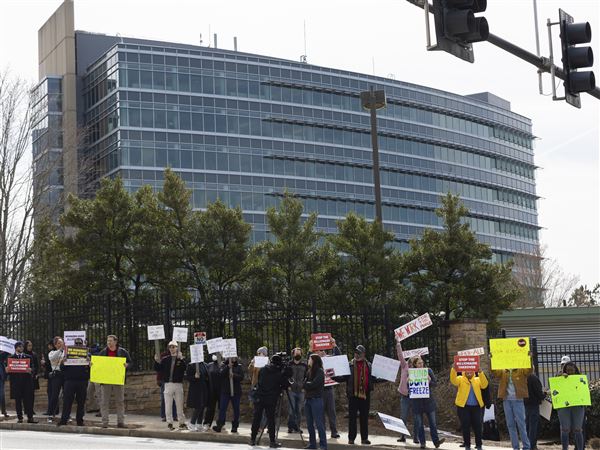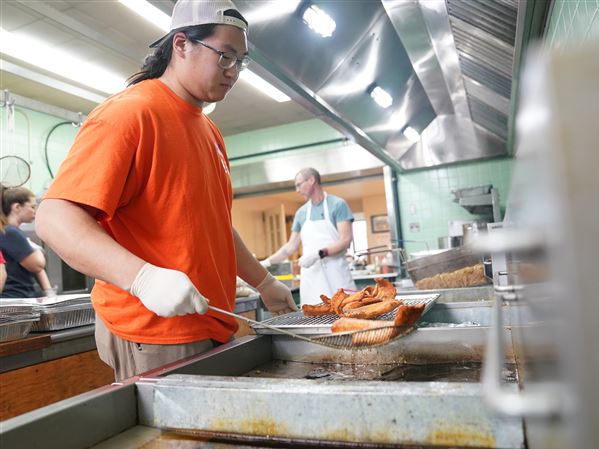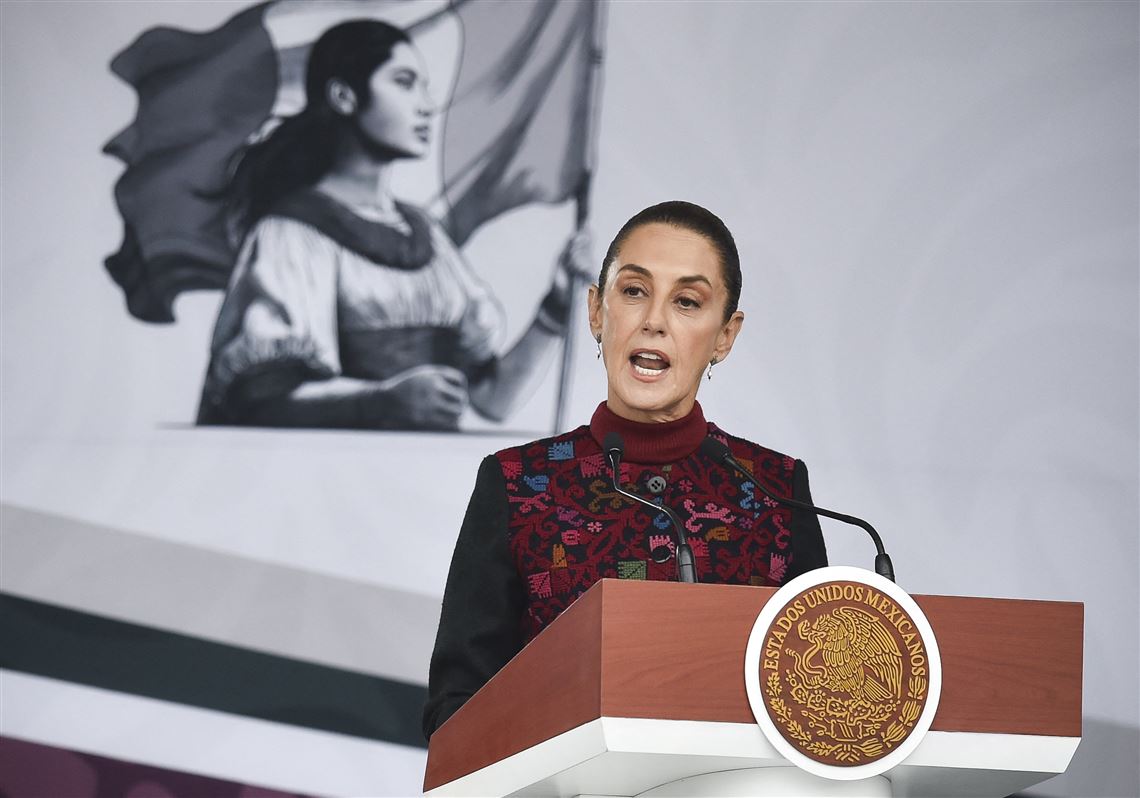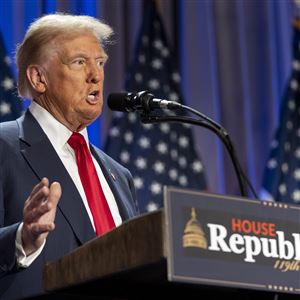DETROIT — If Donald Trump makes good on his threat to slap 25% tariffs on everything imported from Mexico and Canada, the price increases that could follow will collide with his campaign promise to give American families a break from inflation.
Economists say companies would have little choice but to pass along the added costs, dramatically raising prices for food, clothing, automobiles, booze and other goods.
The president-elect floated the tariff idea, including additional 10% taxes on goods from China, as a way to force the countries to halt the flow of illegal immigrants and drugs into the U.S. But his posts Monday on Truth Social threatening the tariffs on his first day in office could just be a negotiating ploy to get the countries to change behavior.
High food prices were a major issue in voters picking Trump over Vice President Kamala Harris, but tariffs almost certainly would push those costs up even further.
For instance, the Produce Distributors Association, a Washington trade group, said Tuesday that tariffs will raise prices for fresh fruit and vegetables and hurt U.S. farmers when other countries retaliate.
“Tariffs distort the marketplace and will raise prices along the supply chain, resulting in the consumer paying more at the checkout line,” said Alan Siger, association president.
Mexico and Canada are two of the biggest exporters of fresh fruit and vegetables to the U.S. In 2022, Mexico supplied 51% of fresh fruit and 69% of fresh vegetables imported by value into the U.S., while Canada supplied 2% of fresh fruit and 20% of fresh vegetables.
Before the election, about 7 in 10 voters said they were very concerned about the cost of food, according to AP VoteCast, a survey of more than 120,000 voters.
“We’ll get them down,” Trump told shoppers during a September visit to a Pennsylvania grocery store.
The U.S. is the largest importer of goods in the world, with Mexico, China and Canada its top three suppliers, according to the most recent U.S. Census data.
People looking to buy a new vehicle likely would see big price increases as well, at a time when costs have gone up so much they are out of reach for many. The average price of a new vehicle now runs around $48,000.
About 15% of the 15.6 million new vehicles sold in the U.S. last year came from Mexico, while 8% crossed the border from Canada, according to Global Data.
Much of the tariffs would get passed along to consumers, unless automakers can somehow quickly find productivity improvements to offset them, said C.J. Finn, U.S. automotive sector leader for PwC. That means even more consumers “would potentially get priced out,” Finn said.
Hardest hit would be Volkswagen, Stellantis, General Motors and Ford, Bernstein analyst Daniel Roeska wrote Tuesday in a note to investors. “A 25% tariff on Mexico and Canada would severely cripple the U.S. auto industry,” he said.
The tariffs would hurt U.S. industrial production so much that “we expect this is unlikely to happen in practice,” Roeska said.
The tariff threat hit auto stocks on Tuesday, particularly shares of GM, which imports about 30% of the vehicles it sells in the U.S. from Canada and Mexico, and Stellantis, which imports about 40% from the two countries. For both, about 55% of their lucrative pickup trucks come from Mexico and Canada. GM stock lost almost 9% of its value, while Stellantis dropped nearly 6%.
It's not clear how long the tariffs would last if implemented, but they could force auto executives to move production to the U.S., which could create more jobs in the long run. However, Morningstar analyst David Whiston said automakers probably won't make any immediate moves because they can't quickly change where they build vehicles.
Millions of dollars worth of auto parts flow across the borders with Mexico and Canada, and that could raise prices for already costly automobile repairs, Finn said.
The Distilled Spirits Council of the U.S. said tariffs on tequila or Canadian whisky won’t boost American jobs because they are distinctive products that can only be made in their country of origin. In 2023, the U.S. imported $4.6 billion worth of tequila and $108 million worth of mezcal from Mexico and $537 million worth of spirits from Canada, it said.
“Tariffs on spirits products from our neighbors to the north and south are going to hurt U.S. consumers and lead to job losses across the U.S. hospitality industry,” it added.
Electronics retailer Best Buy said on its third-quarter earnings conference call that it runs on thin profit margins, so while vendors and the company will shoulder some increases, Best Buy will have to pass tariffs to customers. “These are goods that people need, and higher prices are not helpful,” CEO Corie Barry said.
Walmart also warned last week that tariffs could force it to raise prices.
Tariffs could trigger supply chain disruptions as people buy goods before they are imposed and companies seek alternate sources of parts, said Rob Handfield, a professor of supply chain management at North Carolina State University. Some businesses might not be able to pass on the costs.
“It could actually shut down a lot of industries in the United States. It could actually put a lot of U.S. businesses out of business,” he said.
Canadian Prime Minister Justin Trudeau, who talked with Trump after his call for tariffs, said they had a good conversation about working together. "This is a relationship that we know takes a certain amount of working on and that’s what we’ll do,” Trudeau said.
Trump's threats come as arrests for illegally crossing the border from Mexico have been falling. But arrests for illegally crossing the border from Canada have been rising over the past two years. Much of America’s fentanyl is smuggled from Mexico, and seizures have increased.
Trump has sound legal justification to impose tariffs, even though they conflict with a 2020 trade deal brokered in large part by Trump with Canada and Mexico, said William Reinsch, senior adviser at the Center for Strategic and International Studies and a former Clinton administration trade official. The treaty, known as the USMCA, is up for review in 2026.
In China’s case, he could simply declare Beijing hasn't met obligations under an agreement he negotiated in his first term. For Canada and Mexico, he could say the influx of migrants and drugs are a national security threat, and turn to a section of trade law he used in his first term to slap tariffs on steel and aluminum.
The law he would most likely use for Canada and Mexico has a legal process that often takes up to nine months, giving Trump time to seek a deal.
If talks failed and the duties were imposed, all three countries would likely retaliate with tariffs on U.S. exports, said Reinsch, who believes Trump's tariffs threat is a negotiating ploy.
U.S. companies would lobby intensively against tariffs, and would seek to have products exempted. Some of the biggest exporters from Mexico are U.S. firms that make parts there, Reinsch said.
Longer term, Mary Lovely, a senior fellow at the Peterson Institute for International Economics, said the threat of tariffs could make the U.S. an “unstable partner” in international trade. “It is an incentive to move activity outside the United States to avoid all this uncertainty,” she said.
Trump transition team officials did not immediately respond to questions about what he would need to see to prevent the tariffs from being implemented and how they would impact prices in the U.S.
Mexican President Claudia Sheinbaum suggested Tuesday that Mexico could retaliate with tariffs of its own. Ms. Sheinbaum said she was willing to talk about the issues, but said drugs were a U.S. problem.
“One tariff would be followed by another in response, and so on until we put at risk common businesses,” Ms. Sheinbaum said, referring to U.S. automakers that have plants on both sides of the border.
She said Tuesday that Mexico had done a lot to stem the flow of migrants, noting “caravans of migrants no longer reach the border.” However, Mexico's efforts to fight drugs like the deadly synthetic opioid fentanyl — which is manufactured by Mexican cartels using chemicals imported from China — have weakened in the last year.
Ms. Sheinbaum said Mexico suffered from an influx of weapons smuggled in from the United States, and said the flow of drugs “is a problem of public health and consumption in your country’s society.”
Ms. Sheinbaum also criticized U.S. spending on weapons, saying the money should instead be spent regionally to address the problem of migration. “If a percentage of what the United States spends on war were dedicated to peace and development, that would address the underlying causes of migration,” she said.
Ms. Sheinbaum’s bristly response suggests that Trump faces a much different Mexican president than he did in his first term.
Back in late 2018, former President Andrés Manuel López Obrador was a charismatic, old-school politician who developed a chummy relationship with Trump. The two were eventually able to strike a bargain in which Mexico helped keep migrants away from the border — and received other countries’ deported migrants — and Trump backed down on the threats.
But Ms. Sheinbaum, who took office Oct. 1, is a stern leftist ideologue trained in radical student protest movements, and appears less willing to pacify or mollify Trump.
“We negotiate as equals, there is no subordination here, because we are a great nation,” Ms. Sheinbaum said, while adding, “I think we are going to reach an agreement.”
But Gabriela Siller, director of economic analysis of the financial group Banco Base, fears the personality clash could escalate things into brinkmanship; Trump clearly hates to lose.
“Trump may have just tossed the threat out there, as he does,” Ms. Siller said. “But Mexico's response, that we're going to respond to you with tariffs, that will make Trump really impose them.”
It's not clear how serious Trump’s threat is. The U.S.-Mexico-Canada free trade agreement forbids just imposing tariffs on other member countries. And it’s not clear whether the economy could even tolerate sudden levies on imports: Auto plants on both sides of the border rely on each other for parts and components, and some production lines could screech to a halt.
“It is unacceptable and would cause inflation and job losses in Mexico and the United States,” Sheinbaum said, while offering to talk about the issues. “If tariffs go up, who will it hurt? General Motors,” she said.
“Dialogue is the best path to achieve understanding, peace and prosperity for our two countries,” Sheinbaum said. “I hope our teams can meet soon.”
Late Monday, Trump said he would impose a 25% tax on all products entering the country from Canada and Mexico, and an additional 10% tariff on goods from China, as one of his first executive orders.
The tariffs, if implemented, could dramatically raise prices for American consumers on everything from gas to automobiles to agricultural products. The U.S. is the largest importer of goods in the world, with Mexico, China and Canada its top three suppliers, according to the most recent U.S. Census data.
Trump made the threats Monday in a pair of posts on his Truth Social site in which he railed against an influx of illegal migrants, even though apprehensions at the southern border have been hovering near four-year lows.
“On January 20th, as one of my many first Executive Orders, I will sign all necessary documents to charge Mexico and Canada a 25% Tariff on ALL products coming into the United States, and its ridiculous Open Borders,” he wrote.
He said the new tariffs would remain in place “until such time as Drugs, in particular Fentanyl, and all Illegal Aliens stop this Invasion of our Country!”
“Both Mexico and Canada have the absolute right and power to easily solve this long simmering problem. We hereby demand that they use this power,” he went on, “and until such time that they do, it is time for them to pay a very big price!”
First Published: November 26, 2024, 4:03 p.m.
Updated: November 27, 2024, 5:15 p.m.

















